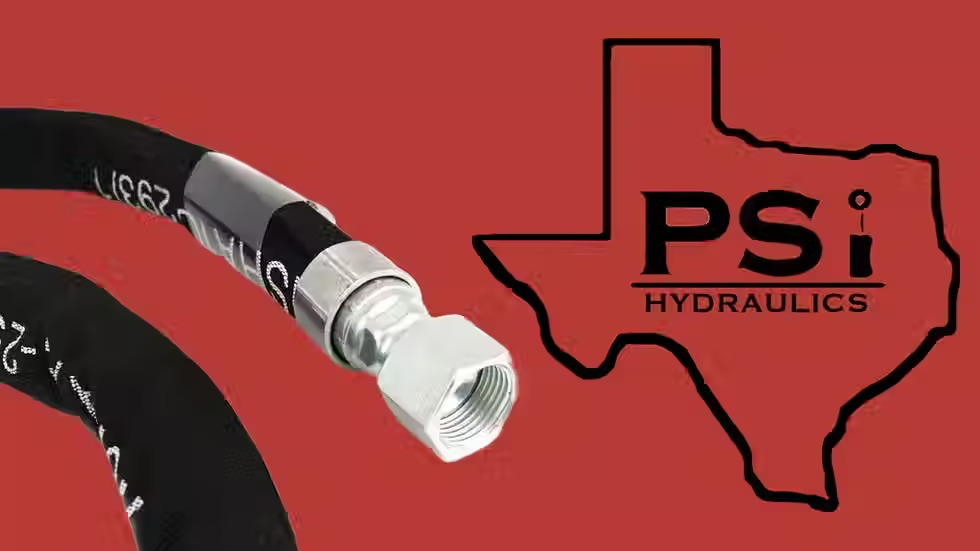Choosing the Right Custom Hydraulic Hose for Your Equipment
- PSI Hydraulics

- Sep 10, 2025
- 4 min read

In the world of hydraulics, the right hose isn’t just a component—it’s a lifeline. Whether you're managing heavy equipment in the field, maintaining an industrial plant, or running a high-pressure mobile system, choosing the right custom hydraulic hose can mean the difference between uninterrupted uptime and costly downtime.
This guide walks through the key factors to consider when selecting a custom hydraulic hose, explains how hose selection impacts system performance, and outlines how PSI Hydraulics ensures the right fit every time.
Why Custom Matters
Standard off-the-shelf hoses may work in a pinch, but custom hydraulic hoses are engineered for your exact operating conditions. That means:
Correct pressure ratings
Optimized hose routing
Resistance to specific fluids or environmental conditions
Proper fitting integration
These aren’t just conveniences. They reduce wear, minimize leaks, and extend the lifespan of your hydraulic systems.
Step 1: Understand Your Application Requirements
Before anything else, identify how and where the hose will be used. Key questions to ask include:
What is the maximum operating pressure?
What temperature range will the hose experience?
What type of hydraulic fluid will be used?
Will the hose be exposed to abrasion, chemicals, UV, or saltwater?
Is the equipment mobile or stationary?
Understanding the full context allows for correct hose selection from the start.
Step 2: Know the STAMPED Method
At PSI Hydraulics, we follow the industry-standard STAMPED criteria to ensure the right match:
Size: Inside diameter, outside diameter, and overall length
Temperature: Operating and ambient temperatures
Application: How the hose is being used
Material/Media: Type of fluid conveyed
Pressure: Maximum working pressure
End fittings: Type and orientation of connections
Delivery: Special requirements like certifications or turnaround time
This structured approach ensures no critical detail is overlooked.
Step 3: Choose the Right Hose Material
Hydraulic hoses are typically made with synthetic rubber, thermoplastics, or PTFE. The material should match your application's environmental and chemical exposure. Here are common options:
Rubber hoses: Versatile, flexible, and widely used
Thermoplastic hoses: Lightweight, high strength, and excellent in extreme environments
PTFE hoses: Resistant to chemicals and high temperatures
PSI stocks and fabricates hoses from all three categories, depending on your needs.
Step 4: Match the Pressure Rating
Every hydraulic system has a maximum operating pressure. Your hose must exceed this, not just meet it. Underrated hoses are one of the top causes of failure.
For systems with pressure spikes, we recommend a safety margin of 1.5x the normal operating pressure. PSI's in-house team helps you calculate this and select the right grade of hose reinforcement (braided, spiral-wound, etc.).
Step 5: Evaluate Temperature Compatibility
Temperature swings can degrade hose performance quickly. Select a hose that performs reliably under both:
Operating temperature (fluid heat)
Ambient temperature (external environment)
For high-heat environments like steel mills or mobile applications in the Texas sun, PSI recommends hoses with specialized covers or thermal guards.
Step 6: Select the Correct Fittings
Fittings are not just an afterthought. Improper fittings cause misalignment, leaks, and even blowouts.
Custom hoses from PSI are made-to-spec with:
SAE and metric fittings
Straight, 45°, and 90° angles
Crimped or reusable ends
Stainless, brass, or plated steel options
Our in-house crimping and pressure-testing ensure leak-free performance.
Step 7: Consider Hose Routing and Movement
Improper routing leads to premature wear and failure. During design, consider:
Minimum bend radius
Avoiding sharp bends or kinks
Room for expansion and contraction
Clamping and protection from abrasion
At PSI, we can prototype the routing layout and recommend hose guards or sleeves as needed.
Step 8: Plan for Service and Maintenance
Select hoses that are accessible and serviceable in the field. PSI provides custom tags, color-coded fittings, and hose labeling so maintenance teams can work quickly and accurately.
We also offer kitting options for fleet or OEM applications—bundled, labeled, and ready to install.
The PSI Difference
When you work with PSI Hydraulics, you’re not just ordering a hose. You’re getting:
Engineering support from Houston-based hydraulic specialists
Fast turnaround and local delivery
Onsite measurement and mobile hose replacement
Pressure testing and quality assurance on every assembly
Whether you’re running a drilling rig, managing plant maintenance, or maintaining a custom-built hydraulic system, PSI builds hoses to perform and last.
Frequently Asked Questions (FAQ)
Q: What’s the difference between braided and spiral hydraulic hoses?
A: Braided hoses typically use one or two layers of reinforcement and are flexible, making them ideal for lower-pressure or tighter-routing applications. Spiral hoses use four or more layers of wire wrap for extreme pressure and are common in heavy-duty equipment.
Q: Can I reuse hydraulic hose fittings?
A: Some fittings are reusable, but not all. Reusable fittings are more common with lower-pressure applications. PSI typically uses crimped fittings for durability, but we can fabricate with reusable types upon request.
Q: How long do custom hydraulic hoses last?
A: It depends on use, pressure, temperature, and exposure. With proper routing and maintenance, quality custom hoses can last several years. PSI provides guidance on service intervals and signs of wear.
Q: What if I don’t know all the hose specs I need?
A: That’s where we come in. Our team can assist with onsite inspection, measurement, and spec confirmation to make sure you get the exact hose you need.
Q: Do you offer emergency or mobile service?
A: Yes. PSI provides mobile hydraulic hose replacement and emergency response in the Houston area and beyond. We bring the tools, fittings, and hose stock to you.

Ready for a Custom Hose That Fits Your Specs Exactly?
Choosing the right custom hydraulic hose means better performance, less downtime, and greater safety for your equipment and your team. PSI helps you get it right the first time—every time.
Contact us today to request a quote or schedule a consultation. Whether you need a single hose or a full system kit, we’ll engineer a solution that’s precise, pressure-rated, and built to last.
.png)






Comments